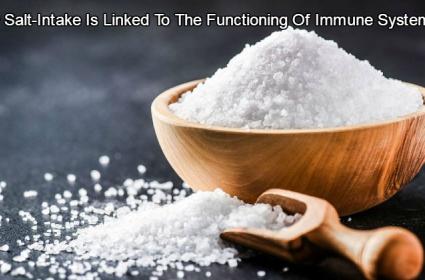Corona Care: Will Salt Rich Diet Make Your Immune System Weaker?

Amid the coronavirus pandemic, we're all looking for ways to keep ourselves as healthy as possible. Many myths related to COVID-19 are surfacing online and there are many blind believers who follow them. In view of this, many experts across the world are trying their best to bust these myths and caution people about these methods, which sometimes can prove to be unsafe.
While it is crucial to follow hygiene measures, maintaining a perfect and healthy immune system is what we all need at this juncture to avoid the virus attack.
Individuals with certain pre-existing illnesses like diabetes, hypertension, cardiovascular disease, and respiratory issues are at a higher risk of contracting the virus. Also, senior citizens with such accompanying morbidities are at greater risk as their immunity reduces as they grow older. In the younger generation with no underlying illnesses, COVID-19 can result in a minor infection, if your immunity is strong.
Just filling your plate with plenty of food isn't enough to ensure immunity. Having knowledge of the advantages and disadvantages of what you eat is a must!
Here in this special feature, we will be giving you a brief on the impact of a salt-rich diet on your immune system!
We all are quite aware that a high- salt diet can result in high blood pressure. But recent studies revealed a link between a salt-rich diet and weaker immune systems. Salt intake is associated with the changes in the immune response of your body. It also has an impact on the activation of immune cells in our bodies.
Experts say that people consume no more than 2.3 grams (g) of sodium per day. This amount is roughly equivalent to 5.8 g of salt, which would fit into a level teaspoon. Studies also suggest that if a person consumes an additional six grams of salt per day, it will lead to an immune deficiency. The World Health Organization (WHO) has recommended a maximum amount of five grams of salt a day.
Excessive salt intake can make the immune cells weaker and hence our body will be at a higher risk of bacterial and viral attacks.
Apart from creating an imbalance in the immune system, excessive salt also leads to various diseases like hypertension, heart diseases, diabetes and various kidney problems. These problems will further lower your immunity which will increase the risk of COVID-19 attack.
Here's a list of health impacts by consuming excess sodium:
Blood pressure: Eating too much salt is linked to hypertension or high blood pressure. Reducing salt intake to 5,000-6,000 milligrams per day has shown to lower blood pressure.
Heart health: If you have heart disease or congestive heart failure, extra salt can cause fluid retention, which can lead to shortness of breath and hospitalization.
Kidney function: If you have kidney disease, too much salt in your diet may cause you to retain fluid, leading to weight gain and bloating.
Diabetes: While not directly connected to blood sugar, eating too much salt increases the risk of complications from diabetes.
So, try to reduce sodium intake in your diet by avoiding processed foods and adding extra salt to your meal. Some people also believe that even if a little more of salt is consumed, it can be flushed out by drinking excess water.
Here is a list of such common beliefs or myths:
1. Drinking more water: Extra water doesn’t ‘wash out’ the salt. High salt intake can lead to bloating and fluid retention.
2. Sweating it out: There are about 500 milligrams of salt in a pound of sweat. Normally, only a very few athletic people will sweat a significant amount of salt. Even though exercising in high temperatures produces more sweat and salt, it can also lead to heatstroke, which can be fatal.
3. Using “healthy” salt options: Sea salt is often talked about as being a better sodium option. And, while sea salt does have a different element make-up than salt (sodium chloride), there’s no clear benefit of choosing sea salt over regular table salt.
CONCLUSION: Your health is in your hands! Your health is your property! So, before consuming anything, know the pros and cons of it. Stay healthy and avoid complications.
Also Read: Corona Care: Fill Your Plate With These Foods To Boost Immunity
Also Read: COVID-19: Do’s And Don’ts For Senior Citizens
Also Read: Will Drinking Warm Water Kill Coronavirus?














